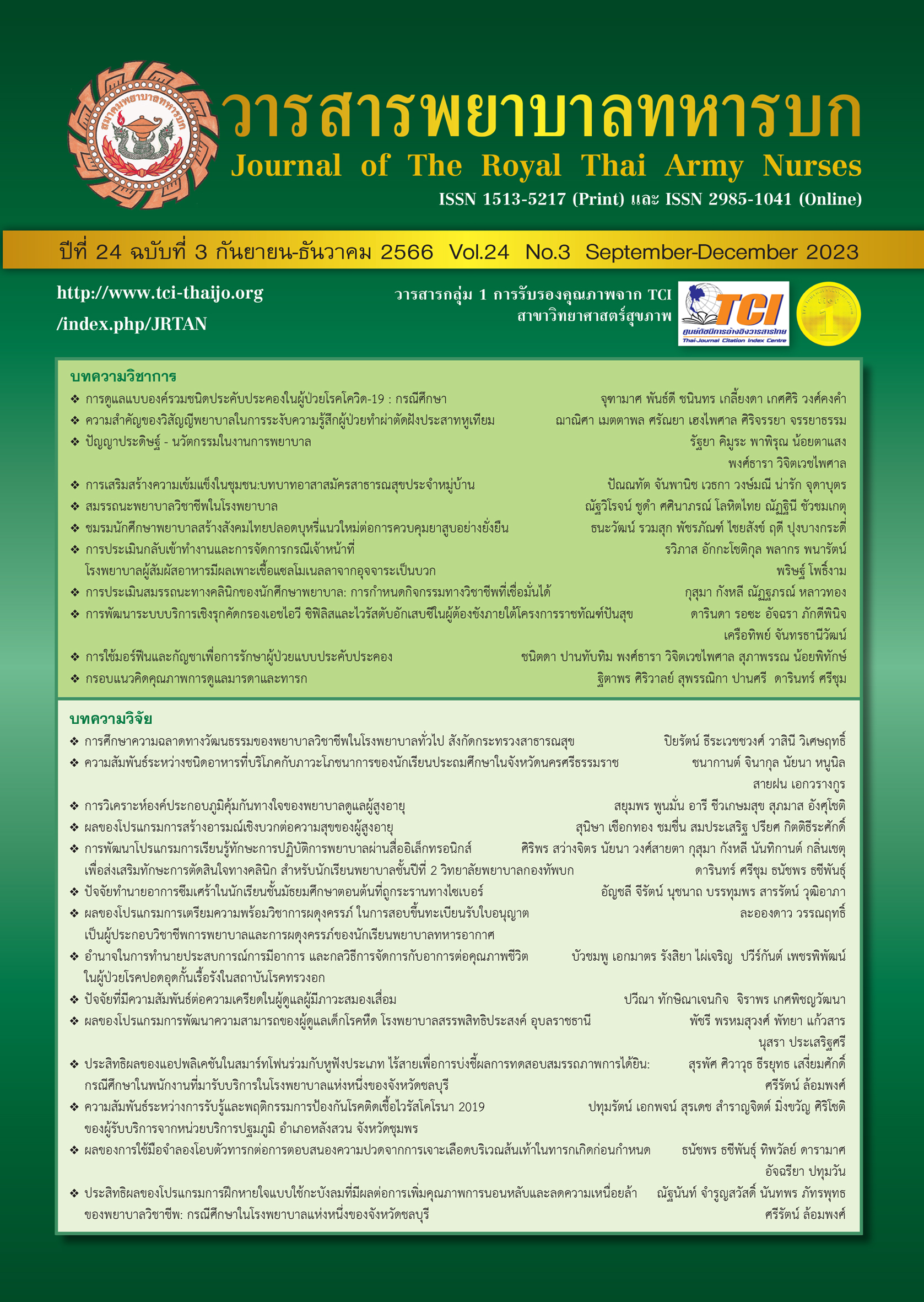Factor Analysis of Resilience in Nurses Caring for Older Persons
Keywords:
Resilience, Professional nurse, older person, Exploratory factor analysisAbstract
The purposes of this study were to examine components and indicators of resilience in nurses caring for older persons. The sample comprised 2 groups. Group 1, there were 12 qualified nursing experts who were selected by the purposive sampling technique. Group 2 included 301 professional nurses in medical units who were selected by the multi-stage random sampling technique. The research instrument consisted of a semi-structured interview and an online questionnaire. The content validities were between 0.6 – 1.0. The reliability of the questionnaires was 0.98. The data were analyzed by using descriptive statistics and exploratory factor analysis.
The findings were as follows. 1) The components of resilience in nurses caring for older persons included 6 components, and 62 indicators with cumulative of variance accounted for 68.63 %. The first dimension, caring attitude toward older persons comprised 9 indicators with standardized factor loading (SFL) ranking from 0.465 to 0.884. The second one, focus on spiritual and interpersonal relationships had 16 indicators with SFL ranking from 0.305 to 0.975. Thirdly, proper context to support caring for older persons consisted of 10 indicators with SFL ranking from 0.309 to 0.871. The fourth aspect, profession of whom nurses caring for older persons contained 11 indicators with SFL ranking from 0.583 to 0.744. The fifth one, good health had 6 indicators with SFL loading ranking from 0.432 to 0.873. The final one, creation of positive attitude and communication to older persons comprised 10 indicators with SFL ranking from 0.374 to 0.685.
Downloads
References
World Health Organization. World report on Ageing and Health. Geneva: World Health Organization; 2015.
National Statistical Office. Survey of the elderly population in Thailand, 2021. Bangkok: Lake & Foundtain Printing Co., Ltd; 2021. (in Thai)
Artsanthia J, Pomthong R. The trend of Elderly Care in 21st Century: Challenging in Nursing Care. Journal of The Royal Thai Army Nurse. 2018;19(1): 39-46. (in Thai)
Health Promotion Foundation. Thai health report 2019. Bangkok: Amarin publishing; 2019. (in Thai)
Benade P., Plessis ED., Koen MP. Exploring resilience in nurses caring for older persons. Journal of Interdisciplinary Health sciences. 2017;22(1): 138-49.
Lin C, Liang F, Han Y, Chen C, Hsieh L. Professional resilience among nurses working in an overcrowded emergency department in Taiwan. International Emergency Nursing. 2019; 42(2): 44-50.
American Psychological Association. The Road to Resilience. Washington: American Psychological Association; 2019.
Department of Mental Health. Turning Bad into Good RQ Mental Health Power. 4thed. Nonthaburi: Beyond Publishing Co., Ltd; 2020. (in Thai)
Cam O, Buyukbayram A. Nurses’ Resilience and Effective Factors. Journal of Psychiatric Nursing. 2017;8(2): 118-26.
Konkanghana P. The development of Resilience Scale for Professional Nurses. Nonthaburi: Sukhothai Thammathirat Open University; 2016. (inThai)
Jirawatanakul S. Qualitative research. In: Satitvittayanand S, editor. Nursing Research, Statistics and Information Technology. 2nd ed. Nonthaburi: Sukhothai Thammathirat Open University; 2016. (in Thai)
Imamee N. research instruments in nursing. In: Satitvittayanand S, editor. Nursing Research, Statistics and Information Technology. 2nd ed. Nonthaburi: Sukhothai Thammathirat Open University; 2017. (in Thai)
Taherdoost H, Sahibuddin S, Jalaliyoon N. Exploratory Factor Analysis; Concepts and Theory. Advances in Applied and Pure Mathematics. Kuala Lumpur: Post-Print; 2014.
Kusolvisitkul W. sampling. In: Satitvittayanand S, editor. Nursing Research, Statistics and Information Technology. 2nd ed. Nonthaburi: Sukhothai Thammathirat Open University; 2017. (in Thai)
Angsuchoti S. The use of factor analysis for instrument development in behavioral sciences. Sripatum Review of Humanities and Social Sciences. 2018;15(1): 125-35. (in Thai)
Kosolchuenvijit J. Caring: Central focus of humanistic care. Journal of Boromarajonani College Nursing. 2013;29(2): 134-41. (in Thai)
Buddhika Network. How to apply Mindfulness to work. Bangkok: Buddhika Network; 2019. (in Thai)
Sumetsittikul A. New Perspective of Elderly Care in Thailand 4.0 Era: Roles of Nursing Administrations. Journal of The Royal Thai Army Nurse. 2018;19(2): 129-35. (in Thai)
Yu F, Raphael D, Mackay L, Smith M, King A. Personal and work-related factors associated with nurse resilience: A systematic review. International Journal of Nursing Studies. 2019; 93 (3): 129–40.
Kim Y, Chang O. Exploring nurse perceptions and experiences of resilience: a meta-synthesis study. Biomedcentral Nursing. 2022; 21(1): 1-13.
Thailand Nursing and Midwifery Council. Nursing Standards 2019. Annual Report 2019 Thailand Nursing and Midwifery Council. Bangkok: Quality Thai Trading Co., Ltd: 2020. (in Thai)
Downloads
Published
How to Cite
Issue
Section
License
Copyright (c) 2023 Journal of The Royal Thai Army Nurses

This work is licensed under a Creative Commons Attribution-NonCommercial-NoDerivatives 4.0 International License.
บทความหรือข้อคิดเห็นใดใดที่ปรากฏในวารสารพยาบาลทหารบกเป็นวรรณกรรมของผู้เขียน ซึ่งบรรณาธิการหรือสมาคมพยาบาลทหารบก ไม่จำเป็นต้องเห็นด้วย
บทความที่ได้รับการตีพิมพ์เป็นลิขสิทธิ์ของวารสารพยาบาลทหารบก
The ideas and opinions expressed in the Journal of The Royal Thai Army Nurses are those of the authors and not necessarily those
of the editor or Royal Thai Army Nurses Association.






